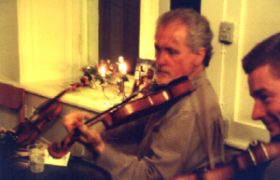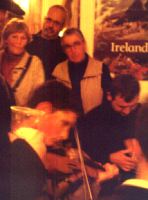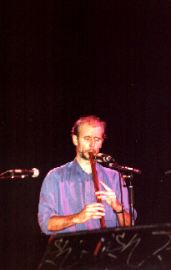FolkWorld article by Michael
Moll:
The Continental Celts series, Part V
Copenhagen's Continental Celtic Feast
The Copenhagen Irish Festival
 Arriving half an hour before the Friday night concert should
start, the way to the bar of the festival café gave already a wonderful indication
of the treats to expect during this November weekend: Several mighty sessions
in the rooms of the café, the atmosphere was great, the Guinness was flowing;
and there was a special kind of cosiness that the Danish would probably call
"hygge" - classicist rooms with comfortable armchairs, lit mainly by candlelight.
And yes, it was a very comfortable weekend with loads of great music.
Arriving half an hour before the Friday night concert should
start, the way to the bar of the festival café gave already a wonderful indication
of the treats to expect during this November weekend: Several mighty sessions
in the rooms of the café, the atmosphere was great, the Guinness was flowing;
and there was a special kind of cosiness that the Danish would probably call
"hygge" - classicist rooms with comfortable armchairs, lit mainly by candlelight.
And yes, it was a very comfortable weekend with loads of great music.
Denmark's Copenhagen is the host of this yearly feast, and as a festival visitor
you would suggest that Copenhagen must be full of Irish people and Irish culture.
A wrong impression, as Martin O'Hare, director of the festival and one of the
few Irish people living in Copenhagen, states. Besides the Copenhagen Irish
Festival, there are not many professional Irish events happening. Yet Copenhagen
has a very healthy musician and session scene. Martin supposes that the best
jam sessions in Scandinavia are in Copenhagen, highlighted in the mighty sessions
in the Bloomsday every Sunday afternoon.
Ireland has become bigger in Copenhagen since the opening of many Irish pubs,
the oldest of them being only nine or ten years old. "The Irish pubs made it
easier for people who live abroad to stay abroad", says Martin. "But things
are very good in Ireland, the economic situation is very good there, so people
they stay in Ireland, and a lot of people abroad go back to Ireland. So emigration
is going the opposite direction."
 Martin himself has been over in Denmark for 22 years, the same time as the
Copenhagen Irish Festival started. Yet he is involved in it only since 11 years.
A band called Scrumpy started the festival as a Scottish-Irish festival in a
smaller club in the environs of Copenhagen. This band was one of Danish people
playing mainly Irish, but also Scottish and English music; and today's festival
organisers are still in touch with these founders of the event.
Martin himself has been over in Denmark for 22 years, the same time as the
Copenhagen Irish Festival started. Yet he is involved in it only since 11 years.
A band called Scrumpy started the festival as a Scottish-Irish festival in a
smaller club in the environs of Copenhagen. This band was one of Danish people
playing mainly Irish, but also Scottish and English music; and today's festival
organisers are still in touch with these founders of the event.
When Martin got involved in it 11 years ago, the festival got a major face-lifting,
being merged into the centre of Copenhagen, also using larger venues, getting
overall bigger. He took the festival over only because Scrumpy had enough to
do all the work related to the festival. The initial idea was to get another
band in to organise the festival; but already after a year, this band was also
fed up with the amount of work for it. "So the next year, just to keep it going,
my wife Maire and me had done it one year. To keep it going and to find somebody
else for it. But it's too much work - nobody wanted to run the festival, but
everybody wanted to go to it."
So Martin sat together with some friends, deciding to form a committee to organise
the festival. And this committee concept was successful enough that ever since
the festival was carried out by a committee of people. "I am the only Irish
in the committee, but there is a Welsh girl, Helen Davies, plays the harp. So
I suppose Helen and me are the foreigners."
They always tried to keep the festival small, and have the idea of working
as an umbrella organisation for people who want to do Irish events that same
weekend, with those events being part of the whole programme. The committee
itself organises mainly the concerts and workshops. This year's successful festival
saw two concerts with top Irish music, plus the Thursday night concert of the
workshop teachers.
On Friday, Sliabh Notes played a brilliant set of traditional Irish Music from
the South-West of Ireland. Fiddler Matt Cranitch, accordionist Donal Murphy
and guitarist Tommy O'Sullivan - the latter having been for some time resident
in Copenhagen - could be found very often in sessions throughout the weekend,
securing a very high standard of the "informal" music part of the festival.
For my taste, the second act of the Friday concert did not fit too well into
this traditional Irish festival: Finbar Furey came up with his radio-friendly
ballads added by a couple of tunes on pipes and flutes. He was over with Gary
O'Briain, and to my personal surprise, the concert was a full success; the audience
obviously loved it. A lot of people had just come to see him, although Finbar
had not been in Denmark for some 20 years.
 Saturday saw a quite perfect concert in the Pumpehuset. Starting off were flute
wizard Cormac Breatnach and guitarist Martin Dunlea, impressing with their stunning
mix of traditions and jazz. Absolutely faboulous. Headliner of the festival
were Patrick Street, a band that is literally unknown in Denmark. Still, the
Copenhagen Irish Festival has the reputation of presenting only quality Irish
Music, so the hall was packed with people enjoying the superb trad music of
this legendary band and the witty comments of Kevin Burke.
Saturday saw a quite perfect concert in the Pumpehuset. Starting off were flute
wizard Cormac Breatnach and guitarist Martin Dunlea, impressing with their stunning
mix of traditions and jazz. Absolutely faboulous. Headliner of the festival
were Patrick Street, a band that is literally unknown in Denmark. Still, the
Copenhagen Irish Festival has the reputation of presenting only quality Irish
Music, so the hall was packed with people enjoying the superb trad music of
this legendary band and the witty comments of Kevin Burke.
Looking at the programme, I thought that the festival was in its core a trad
music winter school, with the amount of quality workshops happening. I was surprised
to hear from Martin that only during the last three years workshops have become
an important part of the festival. "We tried it before, but nobody came to them.
But there are more people playing these days, so there are more people going
to the workshops. We had the harp workshop first time three years ago, and there
came 26 harpists to that; that was amazing to see 26 harps walking in..."
This year, there were something like 10 bodhran pupils grouped around Mel Mercier,
the harp workshop by Helen Davies and Aibhlinn McCrann was visited by ca. 9
musicians. About 10 singers joined also Len Graham and Pádraigin Ní Uallacháin
for the singing workshop, and at least 25 took part in the Step Danicng classes
of Cecilie Karnil. "It is more difficult to get people to the workshops for
flute and fiddle, because not as many play, so that is difficult. But we are
still working on that." With teachers like this year's Dermy Diamond (fiddle)
and Tara Bingham (flute) it is definitely worth also for these workshops to
come to Copenhagen. Speaking of the committee acting as an umbrella organisation,
the Irish Festival's Set dancing workshop is organised by the Copenhagen Set
Dancers, and has been well visited, as could be seen on the final Ceili on Sunday
night.
The Danish-Irish Society of Copenhagen has their own traditional part of the
festival, running on their own a Gaelic mess on the festival Sunday at 1 p.m.
Martin: "There is also music, I think there was even dancing this year. Step
dancing on the altar - it is quite an unusual mess..."
Then there is the film festival, as part of the festival where the committee
is not responsible for. It was run this year the second time, showing seven
different Irish films, old and new. The film organisers are happy with the result,
and promise to hold it again next year. Besides all these official events, there
is always the possibility to join a session as musician or just as a listener.
 The festival café offers great facilities from 12 noon until late in the night,
and usually there were musicians who took advantage of this, providing mighty
sessions, featuring both Danish musicians and booked Irish artists. And there
are the Irish pubs that organise also live music during the weekend.
The festival café offers great facilities from 12 noon until late in the night,
and usually there were musicians who took advantage of this, providing mighty
sessions, featuring both Danish musicians and booked Irish artists. And there
are the Irish pubs that organise also live music during the weekend.
The visitors of the Copenhagen Irish Festival are to a big extent Danish -
obviously, as it is held in Denmark's capital. Still, it draws also quite a
few people from Sweden and Norway - especially since this year's opening of
the ěresund-Bridge from Copenhagen to the Swedish town of Malmö, that highly
supported cultural exchanges in this newly formed region. Additionally, there
are also quite a few Irish guests.
The festival is financed purely by the committee itself, without consistent
sponsorships. "We finance the festival ourselves, and we loose money ourselves,
it's our money. Any profit goes into the next festival, but it's very rarely
a profit. If it pays itself we are very lucky. It really depends on how well
the festival café goes. If it goes well, than it's OK. Because the venues can't
pay themselves, that's impossible - bands like Patrick Street are too expensive
to get the money on the door, the venue costs a lot as well. So it's only good
will - if people come to the bar, having a drink and a good time, they are getting
something for their money, and we are getting some money, and that helps the
festival."
The festival is only a part of what Martin O'Hare does in the Copenhagen Irish
Music scene, also organising the Copenhagen Folk Club, held ca. monthly, and
plays in two Irish bands in Denmark, Ashplant and Trad Lads. "The festival is
all volunteer basis, nobody is paid for anything. It's just like a baby; you
can't throw it away. We adopted it, and so we have it, the adopted festival.
It won't leave by itself so... maybe when it gets older it will leave. But it
is 22, and it doesn't look like it's leaving." And there are a lot of plans
to give the baby an additional taint, like for the next year pub theatre, making
Irish theatre more accessible than this year's theatre play "Catalpa" in a concert
hall was.
 "One of the outstanding celebrations in Europe of the Irish Tradition in Music"
- this is how the Irish Ambassador of Denmark, H.E. James Sharkey, describes
the festival. And indeed it is, as it not only provides formal concerts and
workshops, but also the informal side of the music, as it bridges Irish Music
with continental musicians, as it offers the opportunity to learn the music
from some of the masters. The Copenhagen Irish Festival is an event with a lot
of love in the detail, and it feels still fresh and lively, as you would expect
it of somebody being sweet twenty two.
"One of the outstanding celebrations in Europe of the Irish Tradition in Music"
- this is how the Irish Ambassador of Denmark, H.E. James Sharkey, describes
the festival. And indeed it is, as it not only provides formal concerts and
workshops, but also the informal side of the music, as it bridges Irish Music
with continental musicians, as it offers the opportunity to learn the music
from some of the masters. The Copenhagen Irish Festival is an event with a lot
of love in the detail, and it feels still fresh and lively, as you would expect
it of somebody being sweet twenty two.
"I have looked forward to it with the keenest anticipation since I became Ambassador
to Denmark in 1997", Sharkey says about the festival. May there be many more
edition of this wonderful festival that he can look forward to!
Infos:
- The Copenhagen Irish Festival is held the first weekend of November in the
centre of Copenhagen. Infos can be obtained from the website, www.ashplant.dk,
where you will also find the programme and infos on the Copenhagen Folk Club.
- The Sunday Afternoon traditional Irish Music session that is supposed to
be one of the best in Scandinavia is held every Sunday afternoon from 3 p.m.
in the Bloomsday pub, at the Niels Hemmingsensgade 32 in Copenhagen.
Photo Credit: All Photos by The Mollis
The Continental Celts is an irregular FolkWorld series, presenting regularly the best of Irish folk on the European continent.
Already featured bands: Shantalla (B), Orion (B), Drones & Bellows (DK), Dereelium (D; this issue).
Events: The Gaelfest near Frankfurt (D).
Back to the content of FolkWorld
Articles, Live Reviews & Columns
To the content of FolkWorld
online magazine Nr. 17
© The Mollis - Editors
of FolkWorld; Published 12/2000
All material published in FolkWorld is © The Author via FolkWorld. Storage for private use is allowed and welcome. Reviews and extracts of up to 200 words may be freely quoted and reproduced, if source and author are acknowledged. For any other reproduction please ask the Editors for permission.
FolkWorld - Home of European Music

Layout & Idea of FolkWorld © The Mollis - Editors of FolkWorld
 Arriving half an hour before the Friday night concert should
start, the way to the bar of the festival café gave already a wonderful indication
of the treats to expect during this November weekend: Several mighty sessions
in the rooms of the café, the atmosphere was great, the Guinness was flowing;
and there was a special kind of cosiness that the Danish would probably call
"hygge" - classicist rooms with comfortable armchairs, lit mainly by candlelight.
And yes, it was a very comfortable weekend with loads of great music.
Arriving half an hour before the Friday night concert should
start, the way to the bar of the festival café gave already a wonderful indication
of the treats to expect during this November weekend: Several mighty sessions
in the rooms of the café, the atmosphere was great, the Guinness was flowing;
and there was a special kind of cosiness that the Danish would probably call
"hygge" - classicist rooms with comfortable armchairs, lit mainly by candlelight.
And yes, it was a very comfortable weekend with loads of great music. Martin himself has been over in Denmark for 22 years, the same time as the
Copenhagen Irish Festival started. Yet he is involved in it only since 11 years.
A band called Scrumpy started the festival as a Scottish-Irish festival in a
smaller club in the environs of Copenhagen. This band was one of Danish people
playing mainly Irish, but also Scottish and English music; and today's festival
organisers are still in touch with these founders of the event.
Martin himself has been over in Denmark for 22 years, the same time as the
Copenhagen Irish Festival started. Yet he is involved in it only since 11 years.
A band called Scrumpy started the festival as a Scottish-Irish festival in a
smaller club in the environs of Copenhagen. This band was one of Danish people
playing mainly Irish, but also Scottish and English music; and today's festival
organisers are still in touch with these founders of the event.  Saturday saw a quite perfect concert in the Pumpehuset. Starting off were flute
wizard Cormac Breatnach and guitarist Martin Dunlea, impressing with their stunning
mix of traditions and jazz. Absolutely faboulous. Headliner of the festival
were Patrick Street, a band that is literally unknown in Denmark. Still, the
Copenhagen Irish Festival has the reputation of presenting only quality Irish
Music, so the hall was packed with people enjoying the superb trad music of
this legendary band and the witty comments of Kevin Burke.
Saturday saw a quite perfect concert in the Pumpehuset. Starting off were flute
wizard Cormac Breatnach and guitarist Martin Dunlea, impressing with their stunning
mix of traditions and jazz. Absolutely faboulous. Headliner of the festival
were Patrick Street, a band that is literally unknown in Denmark. Still, the
Copenhagen Irish Festival has the reputation of presenting only quality Irish
Music, so the hall was packed with people enjoying the superb trad music of
this legendary band and the witty comments of Kevin Burke. 